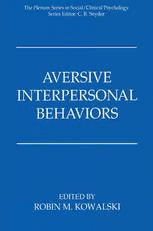
Aversive Interpersonal Behaviors PDF
Preview Aversive Interpersonal Behaviors
AVERSIVE INTERPERSONAL BEHAVIORS THE PLENUM SERIES IN SOCIAL/CLINICAL PSYCHOLOGY Series Editors: C. R. Snyder University of Kansas Lawrence, Kansas Current Volumes in the Series: AGGRESSION Biological, Developmental, and Social Perspectives Edited by Seymour Feshbach andJolanta Zagrodzka AVERSIVE INTERPERSONAL BEHAVIORS Edited by Robin M. Kowalski COERCION AND AGGRESSIVE COMMUNITY TREATMENT A New Frontier in Mental Health Law Edited by Deborah L. Dennis and John Monahan EFFICACY, AGENCY, AND SELF-ESTEEM Edited by Michael H. Kernis PATHOLOGICAL SELF-CRITICISM Assessment and Treatment Raymond M. Bergner PROCRASTINATION AND TASK AVOIDANCE Theory, Research, and Treatment Joseph R. Ferrari, Judith L. Johnson, and William G. McCown THE PSYCHOLOGY OF VANDALISM Arnold P. Goldstein SELF-EFFICACY, ADAPTATION, AND ADJUSTMENT Theory, Research, and Application Edited by James E. Maddux SOCIAL COGNITIVE PSYCHOLOGY History and Current Domains David F. Barone, James E. Maddux, and C. R. Snyder SOURCEBOOK OF SOCIAL SUPPORT AND PERSONALITY Edited by Gregory R. Pierce, Brian Lakey, Irwin G. Sarason, and Barbara R. Sarason A Continuation Order Plan is available for this series. A continuation order will bring delivery of each new volume immediately upon publication. Volumes are billed only upon actual shipment. For further information please contact the publisher. AVERSIVE INTERPERSONAL BEHAVIORS EDITED BY ROBIN M. KOWALSKI Western Carolina University Cullowhee, North Carolina Springer Science+B usiness Media, LLC Library of Congress Catalog1ng-1n-Publ1 cat Ion Data Averslve Interpersonal behaviors / edited by Robin M. Kowalski. p. era. — (The Plenum series 1n soc la 1/ci In lea 1 psychology) Includes bibliographical references and Index. ISBN 0-306-45611-7 1. Interpersonal relations. 2. Social Interaction. 3. Interpersonal conflict. 4. Personality. I. Kowalski, Robin M. II. Series. HM132.A95 1997 302—dc21 97-23743 CIP ISBN 978-1-4757-9356-7 ISBN 978-1-4757-9354-3 (eBook) DOI 10.1007/978-1-4757-9354-3 © 1997 Springer Science+Business Media New York Originally published by Plenum Press, New York 1997 Softcover reprint of the hardcover 1st edition 1997 http: / /www.plenum.com All rights reserved 10 987654321 No part of this book may be reproduced, stored in a retrieval system, or transmitted in any form or by any means, electronic, mechanical, photocopying, microfilming, recording, or otherwise, without written permission from the Publisher To my niece, Sarah Bagwell King CONTRIBUTORS ANITA P. BARBEE, Department of Psychology, University of Louisville, Louisville, Kentucky 40223 ROY F. BAUMEISTER, Department of Psychology, Case Western Reserve University, Cleveland, Ohio 44106-7123 RICHARD BEDNARSKI, Department of Psychology, Wake Forest Univer sity, Winston-Salem, North Carolina 27109 MICHAEL R. CUNNINGHAM, Department of Psychology, University of Louisville, Louisville, Kentucky 40223 PERRI B. DRUEN, Department of Psychology, University of Louisville, Louisville, Kentucky 40223 TIMOTHY DUNCAN, Department of Psychology, Wake Forest University, Winston-Salem, North Carolina 27109 JANET R. ERICKSON, Department of Psychology, Western Carolina Uni versity, Cullowhee, North Carolina 28723 LAURA R. GREEN, Department of Psychology, Florida Atlantic Univer sity, Boca Raton, Florida 33431 DUDLEY HAMMON, Department of Psychology, Wake Forest University, Winston-Salem, North Carolina 27109 ROBIN M. KOWALSKI, Department of Psychology, Western Carolina University, Cullowhee, North Carolina 28723 vii viii CONTRIBUTORS MARK R. LEARY, Department of Psychology, Wake Forest University, Winston-Salem, North Carolina 27109 ROWLAND S. MILLER, Department of Psychology and Philosophy, Sam Houston State University, Huntsville, Texas 77341-2447 DEBORAH R. RICHARDSON, Department of Psychology, Florida Atlan tic University, Boca Raton, Florida 33431 WILLIAM F. SHARKEY, University of Hawaii at Manoa, 2560 Campus Rd., George Hall 326, Honolulu, Hawaii 96822 KRISTIN L. SOMMER, Department of Psychology, Case Western Reserve University, Cleveland, Ohio 44106-7123 KIPLING D. WILLIAMS, School of Psychology, University of New South Wales, Sydney, NSW 2052 Australia PREFACE Our dealings with other people are an inevitable, important, and reward ing part of everyday life. This is most true, of course, of our more intimate friendships and romantic relationships, but our interactions with acquain tances and even strangers also help to weave the fabric of our social lives. Yet, despite the fact that we are, by nature, social creatures and derive innumerable pleasures and benefits from interacting with other people, our social encounters are often awkward, distressing, and downright unpleasant. The flair and fascination that surrounds relationships as they are just beginning fades all too quickly as people perform annoying behaviors, hurt our feelings, embarrass us in front of others, and/or deprive us of interpersonal needs by excluding us. Behaviors that we once thought were cute and endearing at some point strike us as silly, mean, and aversive. Until recently the study of aversive interpersonal behaviors was virtually ignored, superceded by a focus on the positive characteristics of interpersonal interactions. The irony behind this focus on the positive is that, when asked to evaluate the quality of their friendships and romantic relationships, people typically rely on the frequency of negative interper sonal exchanges as opposed to positive interactions. People's memory for aversive interpersonal interactions far exceeds their memory for favorable interpersonal exchanges. The purpose of this book is to examine the less rosy side of interper sonal relationships. As will be shown, however, this does not mean that the reader will be confronted with a completely dark, bleak look at human relationships. Rather, he or she will discover the many facets of aversive interpersonal exchanges, including their role in enhancing the quality of relationships. Several people were instrumental in the completion of this book. Because of the difficulty inherent in editing one's own chapters, I would ix x PREFACE like to thank Mark Leary for his editorial assistance with my part of the book. He also merits recognition for being always supportive and ever ready to bounce ideas around with me. Tom Britt is responsible for the book finally being completed by supporting and encouraging me during the "aversive" times, particularly as the project drew increasingly close to its deadline. Thanks also go to Anne Simons, Ellen Houston, Cindy Snyder, Rose Pritchett, and Benjamin Davis for all of the brainstorming sessions over the past year. Finally, I would like to thank Eliot Werner, Executive Editor at Plenum, and Rick Snyder, Editor of the Social/Clinical series of which this book is a part, for their help with this book. ROBIN M. KOWALSKI
